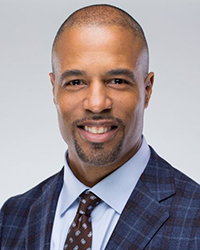CALL TO ACTION
On-the-job learning smooths challenging career transitions
By Frederick Brown
Categories: Career pathways, Collaboration, Mentoring & induction, Standards for Professional LearningJanuary 2024
It’s hard to believe that it’s been 30 years since I first stepped into my assistant principalship in an urban middle school in Elyria, Ohio, a small district 30 miles west of Cleveland. I had been an elementary teacher in that district and was completing my coursework for an administrative certificate. The transition to administration came sooner than I expected: Four assistant principal positions opened in the district at the same time. So, with a clear need before me and the strong encouragement of my colleagues and supervisors, I applied for and accepted a position.
Transitioning into this role required a lot of on-the-job learning. Although my graduate program and coursework positioned me to take on my new role, the job-embedded professional learning was the most important factor that helped me succeed and positioned me to become a principal two years later.

I know I’m not alone in crediting my career growth and success to professional learning because other educators tell me similar stories of their own paths. New roles are always challenging — often in ways that we don’t expect or prepare for — and professional learning is the best way to navigate those challenges so that our work can benefit students, regardless of which role we’re in or how long we’ve been in it.
Based on my own experiences and those other educators have shared with me, here’s my advice about harnessing the power of professional learning as you navigate new roles and career transitions.
New job roles are challenging, often in ways that we don’t expect or prepare for. Professional learning is the best way to navigate those challenges. @fbrownLF #careergrowth #lifelonglearner #TheLearningPro Click To TweetRecognize the power of job-embedded forms of professional learning
When people think about professional learning, they tend to imagine conferences, workshops, and courses. But the most meaningful professional learning I experienced — and the learning that best prepared me for my next career steps — came from coaching, mentoring, and reflection with colleagues.
For example, one of my first challenges as an assistant principal was changing grade levels. Because all of my experiences up to that point had been in an elementary setting, I realized I didn’t fully understand how best to support the middle grades child. As anyone who has worked with them or spent time with them knows, early adolescents have unique needs and strengths. During my time in the middle school, I came to appreciate these a great deal, but during my first days as an assistant principal and my earliest interactions with middle schoolers, I remember thinking about my choice to take the position, “What have I done?!”
Some of the best professional learning for closing my knowledge gap came in the form of coaching from my school’s guidance counselor. I would often sit down with her to discuss situations I found particularly difficult. She helped me better understand the middle school culture and the specific needs of its students. Those conversations also helped me better understand my own philosophies that would guide my work in this new environment.
As we discuss in the Implementation standard of the Standards for Professional Learning, it’s critical that educators engage in meaningful and constructive feedback processes that deepen their understanding and improve their practice. That can be especially important in a new role or setting. But we often forget about the importance of cultivating the relationships with colleagues and mentors that help us engage in that kind of reflection, especially when we feel overwhelmed with new responsibilities. Taking the time and making the effort is essential, even when it feels difficult to carve out the space.
Choose your coaches and mentors wisely
It’s important to be purposeful in identifying your mentors and coaches. There’s no one right person or position, but the key is cultivating the relationships that will benefit you — not leaving it to chance.
Different mentors can support different needs, and sometimes it makes sense to look for support from multiple people. For example, when I was an assistant principal, my school’s principal helped me strengthen my instructional leadership, embodying the Professional Expertise standard. Our conversations were often about instructional philosophies, educator instructional practices, and school culture. As a result, as I entered my second year, I could feel myself getting much clearer on the kind of assistant principal — and, eventually, principal — I wanted to be.
My associate superintendent was another great support and model for me. He used a blended coaching strategy, moving from questioning strategies to a more direct approach, depending on the situation. His way of engaging with me and the other assistant principals not only served me well in the moment, it also became the strategy I used as a principal when I was supporting teachers’ growth and development.
I believe it’s important that the individuals you choose as mentors know that you see them in that role and understand and agree to your expectations of them. For example, at times I needed my associate superintendent to be a coach and ask good questions versus tell me how he would solve a particular issue. Communicating those needs to him was beneficial for both of us.
Cultivate a learning community
Colleagues in similar positions to your own have valuable perspectives to offer and can be a vital source of support. It’s important not to feel alone, especially when you’re the only one in your role in a building, and to lean on the support of peers.
When I was starting out my assistant principalship, I desperately needed professional learning on the procedural responsibilities of the role. In addition to my instructional leadership responsibilities, I supported our school’s student discipline processes and worked with students when their behavior was off track. Although I had taken some wonderful graduate-level classes on discipline policies and processes, including due process procedures for students and guidelines for when and how to engage parents, it all became very real — and challenging — when I had that first student sitting in front of me, facing a suspension, and saying quite forcibly, “I didn’t do anything wrong! My dad will be up here to talk to you!”
Only on-the-job learning would help me apply what I learned in graduate studies to my new job. And I knew that on-the-job learning needed to include the support of colleagues in similar positions. Fortunately, the district’s associate superintendent regularly brought together all four assistant principals into our own learning community. I could turn to this group of colleagues whenever I entered into an experience that was new to me. Together, we lived the Culture of Collaborative Inquiry standard as we each brought problems of practice — including handling discipline issues — to the team for discussion and reflection. I didn’t have the words to describe it then, but we were engaged in rapid cycles of improvement.
Pay it forward
The key link among the powerful professional learning experiences I’ve described is that they were all job-embedded. I encourage all educators, regardless of your position, to recognize the importance of these types of professional learning and add them to your tool kit. Often, people look only to workshops and courses, but those are most effective when coupled with job-embedded support. That combination smoothed my path from assistant principal to principal so that I could be effective immediately for students, and it can smooth any professional path and increase student success.
As you are seeking out these kinds of learning opportunities, I also encourage you to recognize your role in supporting others and to pay it forward. Once I became a principal, coaching and mentoring other aspiring principals was not just a kind thing for me to do, it was actually my responsibility to our district. Whether or not it’s an official part of your job, encouraging the growth of colleagues is important. It strengthens the field of education and the satisfaction it brings can help sustain you, too.
Download pdf here.
Make time to cultivate relationships with colleagues and mentors. It’s important to reflect in community, especially when we feel overwhelmed with new responsibilities. #ProfDev #Collaboration #TheLearningPro Click To Tweet
Frederick Brown is Learning Forward’s president | CEO. Fred is an education visionary who knows firsthand that our nation’s schools need transformational change if we are to meet the challenges of the next decades. Fred advocates that every child deserves to reach their highest potential and every educator must have the opportunity to participate in exemplary, ongoing, professional learning programs to provide students the skills needed to meet their unique needs.
Supporting educators at all levels and improving student achievement are through lines of Fred's career. An elementary school teacher, a middle school assistant principal, and school principal, Fred saw firsthand the impact high-leverage instructional practices and school culture have on school success.
Fred is a frequent speaker on leadership and building high-quality learning in schools. He has co-authored two books that have made significant contributions to the field of education, demonstrating how a comprehensive approach to professional learning can be achieved so that everyone in a system is a learner, and how principals apply a learning lens to their many critical responsibilities to create a productive climate for learning and collaboration. "Becoming a Learning System" and "The Learning Principal -- Becoming a Learning Leader" are time-tested Learning Forward resources for schools and leaders.
Categories: Career pathways, Collaboration, Mentoring & induction, Standards for Professional Learning
Recent Issues
EVALUATING PROFESSIONAL LEARNING
February 2024
How do you know your professional learning is working? This issue digs...
TAKING THE NEXT STEP
December 2023
Professional learning can open up new roles and challenges and help...
REACHING ALL LEARNERS
October 2023
Both special education and general education teachers need support to help...
THE TIME DILEMMA
August 2023
Prioritizing professional learning time is an investment in educators and...











